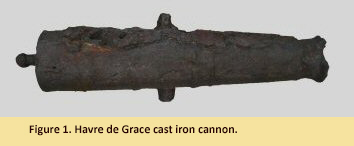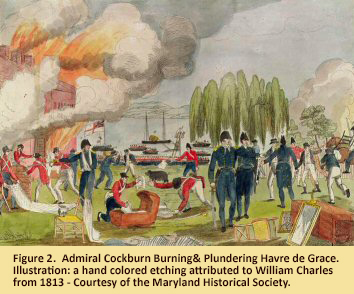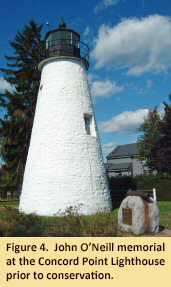Havre de Grace Cannon
September 2009
By Caitlin Shaffer, MAC Lab Conservator
 This cast iron cannon (Figure 1), currently at the Maryland Archaeological Conservation Laboratory, was likely used against the British Navy
in the spring of 1813. Coastal Maryland, like much of the Eastern Seaboard during the War of 1812, was routinely harassed by the British
naval fleet. The Chesapeake area had an especially large British naval presence, as the Royal Navy sought to blockade the Bay and
prevent the shipbuilding and privateering operations taking place in Baltimore and the surrounding towns (Byron 1964: 13-14). Many
communities were raided, including Havre de Grace in the early morning of May 3, 1813.
This cast iron cannon (Figure 1), currently at the Maryland Archaeological Conservation Laboratory, was likely used against the British Navy
in the spring of 1813. Coastal Maryland, like much of the Eastern Seaboard during the War of 1812, was routinely harassed by the British
naval fleet. The Chesapeake area had an especially large British naval presence, as the Royal Navy sought to blockade the Bay and
prevent the shipbuilding and privateering operations taking place in Baltimore and the surrounding towns (Byron 1964: 13-14). Many
communities were raided, including Havre de Grace in the early morning of May 3, 1813.
 Having heard that the British were nearby, the residents of Havre de Grace were ready to defend their town (Whitehorne 1997: 48). The local
militia kept watch at the "Potato Battery" on Concord Point, which consisted of one nine-pounder and two six-pounder cannon. When the
attack came, the only militiaman to hold his ground was John O'Neill, who single-handedly manned the battery until he was captured. He
was imprisoned by Admiral Cockburn aboard the Maidstone for three days. Although the town was burned and ransacked (Figure 2), O'Neill
became a local hero. When the lighthouse was built at Concord Point in 1827, he was given the position of lighthouse keeper in appreciation
of his brave actions. Successive generations of his family followed as keepers of the lighthouse until it was automated in 1920 (Vojtech
1996: 10).
Having heard that the British were nearby, the residents of Havre de Grace were ready to defend their town (Whitehorne 1997: 48). The local
militia kept watch at the "Potato Battery" on Concord Point, which consisted of one nine-pounder and two six-pounder cannon. When the
attack came, the only militiaman to hold his ground was John O'Neill, who single-handedly manned the battery until he was captured. He
was imprisoned by Admiral Cockburn aboard the Maidstone for three days. Although the town was burned and ransacked (Figure 2), O'Neill
became a local hero. When the lighthouse was built at Concord Point in 1827, he was given the position of lighthouse keeper in appreciation
of his brave actions. Successive generations of his family followed as keepers of the lighthouse until it was automated in 1920 (Vojtech
1996: 10).
 In 1914, Havre de Grace held a centennial commemoration of the war, and O'Neill's descendants unveiled a memorial (Figure 3) to "John
O'Neill, The Gallant Defender of Havre de Grace Against the British Attack in 1813" (Unknown 1914: program cover). The memorial consists
of an iron cannon placed on a marble base and a plaque detailing O'Neill's story. Fittingly, it is located on the site of the "Potato
Battery" next to
In 1914, Havre de Grace held a centennial commemoration of the war, and O'Neill's descendants unveiled a memorial (Figure 3) to "John
O'Neill, The Gallant Defender of Havre de Grace Against the British Attack in 1813" (Unknown 1914: program cover). The memorial consists
of an iron cannon placed on a marble base and a plaque detailing O'Neill's story. Fittingly, it is located on the site of the "Potato
Battery" next to
 the Concord Point lighthouse. The cannon used in the memorial is dated circa 1812 and was found in the Chesapeake
Bay near Havre de Grace. Although this style of cannon was widely used by the Americans during the War of 1812 (Manucy 1985: 12),
it is possible that this cannon is one of the original "Potato Battery" cannon used by John O'Neill in his defense of the town.
the Concord Point lighthouse. The cannon used in the memorial is dated circa 1812 and was found in the Chesapeake
Bay near Havre de Grace. Although this style of cannon was widely used by the Americans during the War of 1812 (Manucy 1985: 12),
it is possible that this cannon is one of the original "Potato Battery" cannon used by John O'Neill in his defense of the town.
The memorial has been moved within Havre de Grace several times, but it was returned to its original location at Concord Point in the
early 1980s (Figure 4). Decades of exposure to the natural elements has caused the deterioration of the cannon, and most of its original
surface has corroded away. If left unchecked, its condition would have continued to decline; however, it was recently removed from
its base and transported to the MAC Lab, where it will undergo conservation treatment. The methods used to stabilize and protect the cannon
will allow it to be returned to Concord Point, where it can continue to commemorate O'Neil's distinctive place in Maryland history.
Thanks to Marsha Jacksteit at the Friends of Concord Point Lighthouse for supplying us with historical documents and photographs related to the O'Neill cannon.
| References |
|
| Byron, Gilbert |
| 1964 |
The War of 1812 on the Chesapeake Bay. Baltimore: Maryland Historical Society. |
|
| Ma |
| nucy, Albert |
| 1985 |
Artillery Through the Ages. Washington, DC: National Park Service. |
|
| Unknown |
| 1914 |
Program from "Unveiling Exercises of the Centennial Memorial to John O'Neill." |
|
| V |
| ojtech, Pat |
| 1996 |
Lighting the Bay, Tales of Chesapeake Lighthouses. Centreville, Maryland: Tidewater Publishers. |
|
| Wh |
| itehorne, Joseph |
| 1997 |
The Battle for Baltimore 1814. Baltimore: The Nautical & Aviation Publishing Company of America. |
|